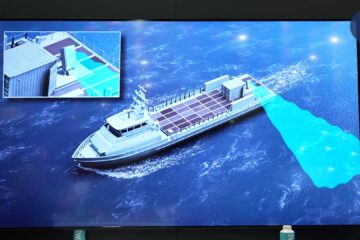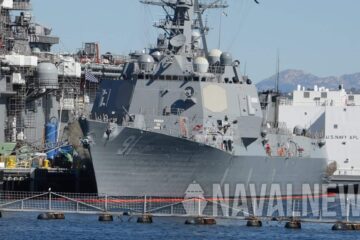Transition was completed on May 14, the U.S. Navy announced. VP-40 began the P-8A platform transition in November 2019 following its return to Naval Air Station (NAS) Whidbey Island after completing the Navy’s final active duty P-3C deployment. On this landmark deployment, the Fighting Marlins made significant contributions to international maritime security while conducting sustained operations from three continents, marking the conclusion of VP-40’s forward-deployed P-3C operations that began in 1968.
The squadron completed the last of its nine P-3C aircraft transfers with the delivery of aircraft 162776 to the Naval Aviation Museum in Pensacola, Fla., and then commenced P-8A transition training under the instruction of VP-30, the Navy’s Patrol and Reconnaissance Fleet Replacement Squadron based out of NAS Jacksonville. VP-30 has been conducting squadron transitions to the P-8A since 2012 utilizing a team of military and civilian maintenance and aircrew professionals.
“The P-8 operates very differently from the P-3, but the fundamentals of being a pilot remain the same,” said Lt. Alan Thornhill, a pilot with VP-40. “The aircraft has a lot more technology [than the P-3C] and can provide its pilots an immense amount of information. Knowing what information is important and relevant at any given moment still takes practice and training. Automation makes the plane fly more safely but is limited by the understanding and ability of the person managing the automation to make safe and timely decisions. We still focus heavily on the mantra of “aviate, navigate, communicate” to keep ourselves caged on the important details of whatever phase of flight we are in.”
With transition complete, VP-40 is now preparing to execute forward-deployed operations across the globe and across all Maritime Patrol and Reconnaissance mission areas, including anti-submarine warfare, anti-surface warfare, intelligence, surveillance, and reconnaissance, and search and rescue.
“The hard work of our Sailors and the Sailors of VP-30 allowed us to complete this transition process so seamlessly,” said Cmdr. Matt McKerring, VP-40’s Commanding Officer. “Once again, VP-40 has accomplished our mission successfully and on schedule regardless of any obstacles or challenges. After more than 50 years with the P-3C Orion, the Fighting Marlins are ready to tackle another 50 years with the P-8A Poseidon.”
About P-8A Poseidon MPA

The P-8A is a long-range multi-mission maritime patrol aircraft capable of broad-area, maritime and littoral operations. A military derivative of the Boeing Commercial Next-Generation 737 airplane, the P-8A combines superior performance and reliability with an advanced mission system that ensures maximum interoperability in the battle space.
The P-8A is militarized with maritime weapons, a modern open mission system architecture, and commercial-like support for affordability. The aircraft has been modified to include a bomb bay and pylons for weapons – two weapons stations on each wing – and can carry 129 sonobuoys. The aircraft is also fitted with an in-flight refueling system. With more than 180,000 flight hours to date, P-8 variants, the P-8A Poseidon and the P-8I, patrol the globe performing anti-submarine and anti-surface warfare; intelligence, surveillance and reconnaissance; humanitarian; and search and rescue missions.
Boeing delivered the 100th P-8A aircraft in mid-May. This was the 94th mission-capable airplane to enter the U.S. Navy fleet, with six additional jets used as Engineering Manufacturing Development test aircraft. The 100th fully-operational delivery is scheduled for later this year. Boeing has also delivered 12 jets to the Royal Australian Air Force, two to the U.K.’s Royal Air Force and eight P-8Is to the Indian Navy. Norway will begin receiving their five P-8As in 2022; both New Zealand and South Korea have signed agreements with the U.S. Navy to purchase four and six aircraft respectively.






